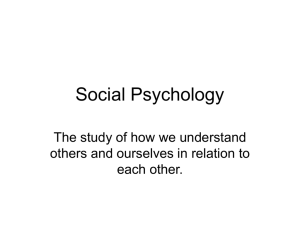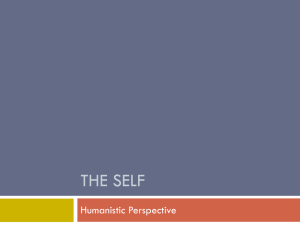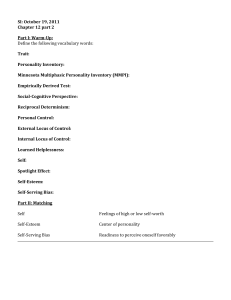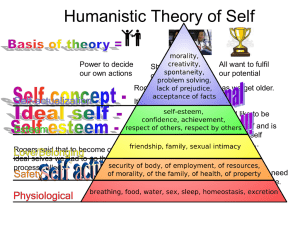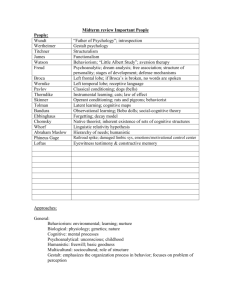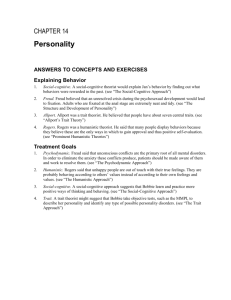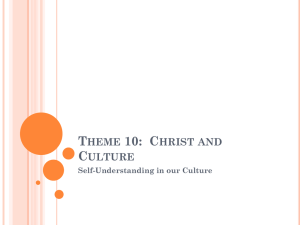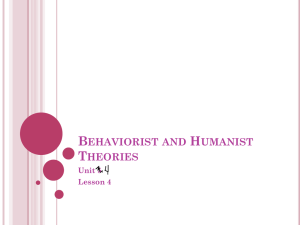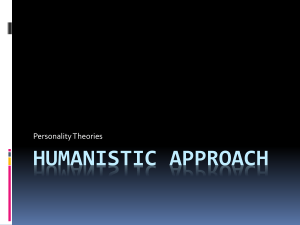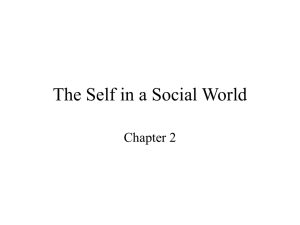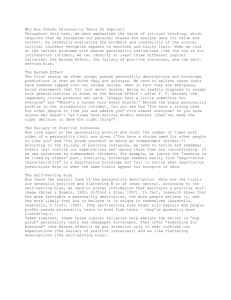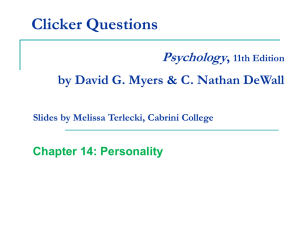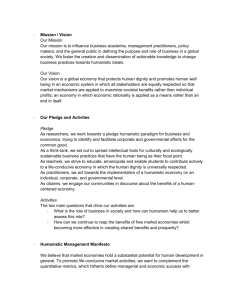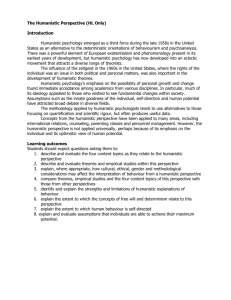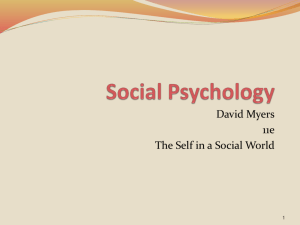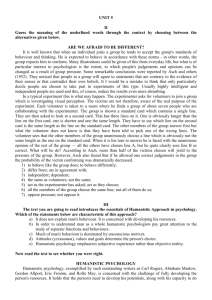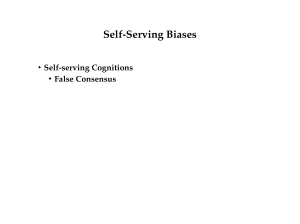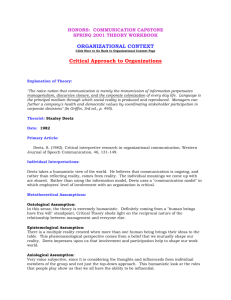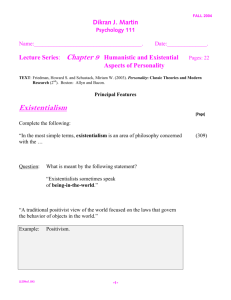The Humanistic Perspective and Social Cognitive
advertisement
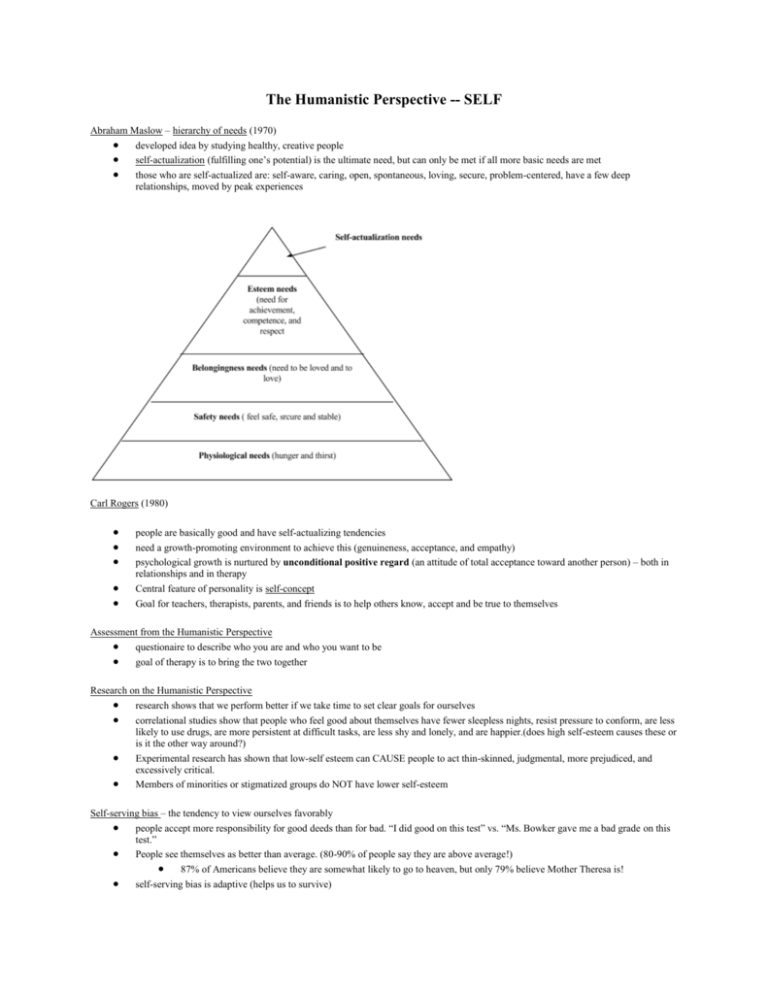
The Humanistic Perspective -- SELF Abraham Maslow – hierarchy of needs (1970) developed idea by studying healthy, creative people self-actualization (fulfilling one’s potential) is the ultimate need, but can only be met if all more basic needs are met those who are self-actualized are: self-aware, caring, open, spontaneous, loving, secure, problem-centered, have a few deep relationships, moved by peak experiences Carl Rogers (1980) people are basically good and have self-actualizing tendencies need a growth-promoting environment to achieve this (genuineness, acceptance, and empathy) psychological growth is nurtured by unconditional positive regard (an attitude of total acceptance toward another person) – both in relationships and in therapy Central feature of personality is self-concept Goal for teachers, therapists, parents, and friends is to help others know, accept and be true to themselves Assessment from the Humanistic Perspective questionaire to describe who you are and who you want to be goal of therapy is to bring the two together Research on the Humanistic Perspective research shows that we perform better if we take time to set clear goals for ourselves correlational studies show that people who feel good about themselves have fewer sleepless nights, resist pressure to conform, are less likely to use drugs, are more persistent at difficult tasks, are less shy and lonely, and are happier.(does high self-esteem causes these or is it the other way around?) Experimental research has shown that low-self esteem can CAUSE people to act thin-skinned, judgmental, more prejudiced, and excessively critical. Members of minorities or stigmatized groups do NOT have lower self-esteem Self-serving bias – the tendency to view ourselves favorably people accept more responsibility for good deeds than for bad. “I did good on this test” vs. “Ms. Bowker gave me a bad grade on this test.” People see themselves as better than average. (80-90% of people say they are above average!) 87% of Americans believe they are somewhat likely to go to heaven, but only 79% believe Mother Theresa is! self-serving bias is adaptive (helps us to survive) self-serving bias tends to vanish when bracing ourselves for feedback (tend to think you did worse on test right before you get it back) Individualism vs. Collectivism Individualism – giving priority to individual goals over group goals; define identity in terms of personal attributes, strive for personal achievement (Americans) individual name first feel free to switch jobs, churches, families, homes enjoy more privacy, accept more different lifestyles, respect for defining one’s own identity more divorce, homicide, stress-related disease, and loneliness Collectivism – giving priority to group goals over individual goals; define self as part of social network, gain a sense of belonging and security by group identification (rural Asia) family name first deeper and longer relationships maintaining harmony is very important; avoid direct confrontation Criticisms of Humanistic Perspective concepts are vague and subjective can lead to self-indulgence, selfishness, and erosion of moral restraints fails to appreciate human capacity for evil The Social-Cognitive Perspective Focus is on how we interpret and respond to external events. Cognitive therapy attempts to change they way you THINK about things. Believe in reciprocal determinism – environment influences personality, which in turn, influences environment. Examples: The type of person you were made you choose to come to POB. Attending POB has probably shaped your personality in some ways. Anxious people are more attuned to threatening events. They will perceive the world as more threatening, which in turn, may make them more anxious. If you are easy-going, you make other people feel comfortable. This in turn, causes them to treat you nicely. This may affect how you view other people. Personal Control whether we see ourselves as controlling or controlled by our environment external locus of control – perception that we are controlled by our environment; our fate is out of our control internal locus of contol (ILC)– perception the we control our own fate those with ILC tend to do better in school, act more independently, enjoy better health, feel less depressed, and cope better with stress learned helplessness (Seligman) Dogs were strapped in a harness and given repeated shocks, with no opportunity to avoid them. When later put in a similar situation where they could avoid shocks, they didn’t bother. Instead, cowered without hope. People who are repeatedly in situations in which they have no control begin to lose hope. They are less likely to try to escape bad situations in the future (even if easy) – battered wives. those who are optimistic and believe that they have control over their lives tend to be more successful and have better health However, overconfidence can be bad too overconfident students often perform lower (so we need some realism as well) overconfidence can lead us to take unwise risks Criticisms of the Social-Cognitive Perspective focuses too much on the situation and not enough on inner traits Summary of Perspectives Excellent Chart in book (p. 504, Table 14.2)
